Coronavirus: Burning question about Oxford COVID-19, Moderna vaccines, EU announces deal
AstraZeneca’s vaccine is to arrive in Australia early next year after proving 90 per cent effective as Europe clinches deal with Moderna, but questions about the jabs remain.
Coronavirus
Don't miss out on the headlines from Coronavirus. Followed categories will be added to My News.
AstraZeneca’s successful COVID-19 vaccine is to be submitted for regulatory approval in Australia, a crucial step before it can be approved for use.
The pharmaceutical company announced overnight clinical trials had found it was up to 90 per cent effective.
“Following the positive high-level results from two of the phase II/III Oxford University-led clinical trials, AstraZeneca will submit the data to the Therapeutic Goods Administration (TGA) for their review and evaluation,” the company said in a statement.
And it said it hopes to supply the first doses to the Australian public by the first quarter of next year.
The vaccine must pass the Therapeutic Goods Administration’s (TGA) rigorous assessment and approval processes before it is approved for use in Australia.
The TGA is fast tracking vaccine approval and has already issued a provisional determination signalling it is willing to accept the trial data and start the approval process.
“We have committed to supplying 33.8m doses for the Australian Government; 30 million doses will be produced onshore by CSL and manufacturing is already underway here in Australia.” AstraZeneca ANZ Country President, Liz Chatwin, said:
News Corp revealed on the weekend the first batch of the AstraZeneca vaccine produced by Australia’s CSL is on track to be ready by Christmas.
“Through our global partnership with Oxford University, AstraZeneca has committed to providing broad and equitable access to the vaccine, at no profit during the pandemic, to address an urgent global public health need and support economic recovery,” Ms Chatwin said.
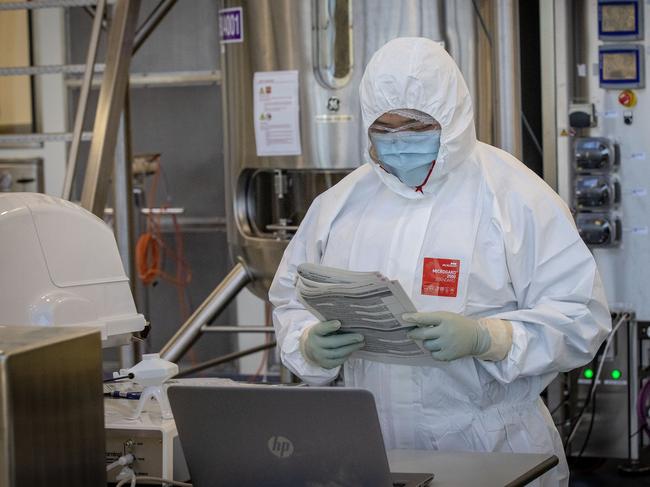
The company said even though the vaccine development program is faster than typical,” patient safety is of paramount importance”.
Timelines have been accelerated by investing in building manufacturing capacity of the vaccine in advance.
AstraZeneca said it had the largest manufacturing network around the world, and with its manufacturing partners, has capacity for more than 3 billion doses of the vaccine for broad and equitable global distribution.
AstraZeneca and its partners Oxford University and CSL are working together to try and meet the Australian Government’s objective of having the first doses of the vaccine available to Australia as early as the first quarter of 2021, the company said.
MYSTERY OVER WHY HALF DOSE IS MORE EFFECTIVE
It’s the mystery that could be the key to a faster rollout of a COVID-19 vaccine — why did people respond better when given only a half dose of AstraZeneca’s vaccine?
While scientists are still trying to figure out why it happens the good news is it means less of the vaccine will be needed to dose each person so more people are likely to get it more quickly.
AstraZeneca’s COVID-19 vaccine was only 62 per cent effective in people given two full doses delivered a month apart the company revealed.
But among those who received just a half dose in their first jab and then a full dose in their second jab the vaccine was 90 per cent effective.
Scientists are speculating there could be a number of possible reasons the half dose regime is more effective.
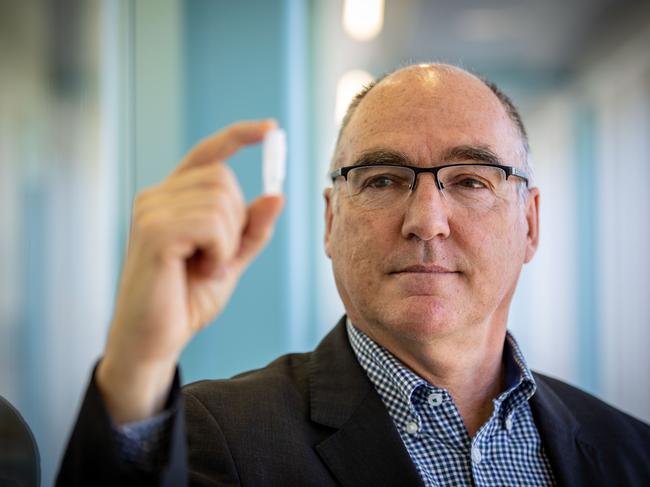
One is that there was only a small number of people involved in the half dose trial the trial —2741 participants compared to 8,895 in the full dose arm of the trial.
The trial might not have been big enough to gauge the difference between the two regimens, and the differences will vanish once more cases of COVID-19 are detected, Luk Vandenberghe, a virologist at the Massachusetts Eye and Ear Institute and Harvard Medical School in Boston has suggested.
Another theory is that it could be related to the de-activated chimpanzee virus the Oxford/AstraZeneca vaccine uses to prompt our immune system to respond to the virus that causes COVID-19.
It’s possible that the chimpanzee virus may have blunted the immune systems reaction to the first dose of the vaccine said Katie Ewer, an immunologist at Oxford’s Jenner Institute which invented the vaccine.
Other explanations include that lower doses of vaccine are better at stimulating immune cells called T cells that support the production of antibodies, she said.
Or, the half dose could lead more quickly to the establishment of ‘memory’ immune cells that are triggered by a second-dose boost. Waiting longer between the two doses could achieve the same effect Hildegund Ertl, a viral immunologist at the Wistar Institute in Philadelphia told Nature briefing.
OXFORD VACCINE WILL COST $4 A DOSE
Australia’s biggest vaccine bet is on track to be rolled out in March, Health Minister Greg Hunt said.
“I am delighted with the latest results from the Oxford AstraZeneca vaccine,” he said.
“Subject to approval, this means that Australians are very much on track for first vaccines in March.”
AstraZeneca will now “immediately” prepare paperwork to get the jab signed off for approval.
Australia has ordered 33.8 million doses, most of which will be made by CSL in its Melbourne factory.
The results were based on trials from the UK and Brazil, with studies showing that a half dose, followed by a full dose a month later, was able to produce up to 90 per cent effectiveness.
AstraZeneca said in a statement that it would seek emergency use listing from the World Health Organisation.
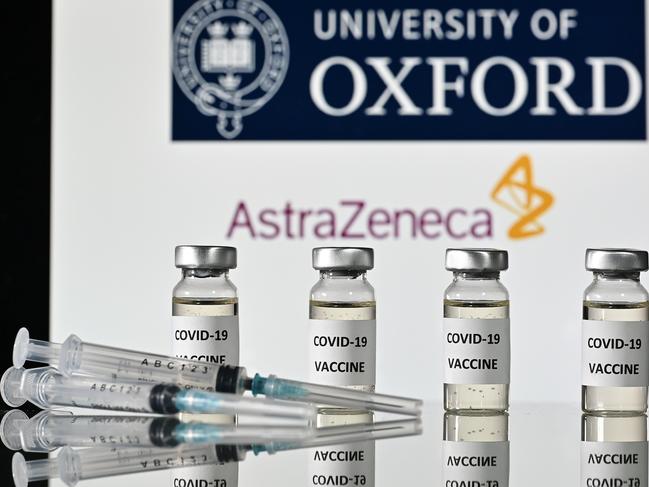
Professor Andrew Pollard, chief investigator of the Oxford Vaccine Trial, said: “These findings show that we have an effective vaccine that will save many lives.
“Excitingly, we’ve found that one of our dosing regimens may be around 90% effective and if this dosing regime is used, more people could be vaccinated with planned vaccine supply.”
There have already been remarkable results in trials of the Pfizer and Moderna vaccines which showed almost 95 per cent effectiveness.
The half dose plus full dose regime would also mean that it could be used on more people than if two full doses were needed, as originally thought.
Pascal Soriot, Chief Executive Officer, of AstraZeneca said that the results were an important milestone.
“This vaccine’s efficacy and safety confirm that it will be highly effective against COVID-19 and will have an immediate impact on this public health emergency,” he said.
“Furthermore, the vaccine’s simple supply chain and our no-profit pledge and commitment to broad, equitable and timely access means it will be affordable and globally available, supplying hundreds of millions of doses on approval.”
The head of AstraZeneca in France, Olivier Nataf, said that the vaccine will be made available at cost price. This is a different strategy from some of their competitors. Asked by AFP what the thinking was behind the strategy, Mr Nataf said “it’s more than a strategy, it’s a commitment.”
“The price is around 2.50 euros ($A4) per dose. This is the main subject of our agreement with Oxford, in order to be able to provide this vaccine to the widest possible population, under the most equitable conditions of access possible,” he said.
“We are committed to these three billion doses at cost price for 2021. We must not forget that this is a race against the virus rather than a race for the vaccine between competitors.
As an industrialist, I hear this a lot, but in fact there are a lot of collaborations in this race against the virus: Pfizer has partnered with BioNtech, Sanofi with GSK, AstraZeneca with the University of Oxford.”
EU ANNOUNCES VACCINE CONTRACT WITH MODERNA
Meanwhile, the EU said on Tuesday (local time) it would sign a sixth contract for an upcoming coronavirus vaccine, this time for up to 160 million doses of a jab developed by US firm Moderna.
“According to the results of clinical trials, this vaccine could be highly effective against COVID-19,” European Commission President Ursula von der Leyen said.
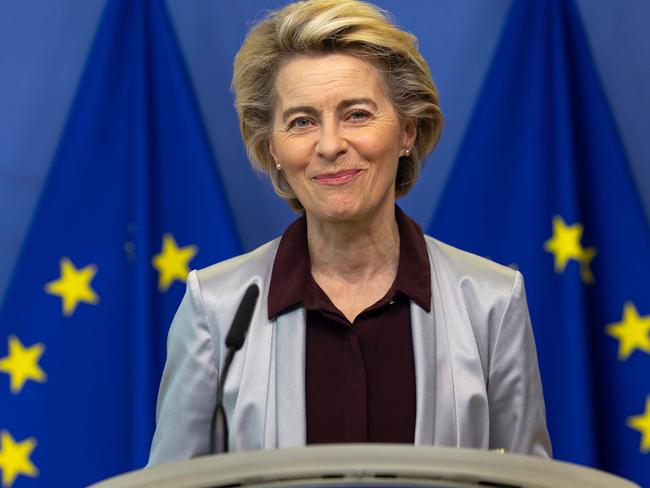
“Once the vaccine is indeed proven as safe and effective, every member state will receive it at the same time on a pro rata basis,” she said, in a brief statement.
Details of the contract, including any purchase options within the 160 million possible total number of doses, will be announced when it is signed on Wednesday.
Brussels has previously signed contracts for hundreds of millions of doses of possible future vaccines from Johnson & Johnson, Sanofi-GSK, AstraZeneca, Pfizer-BionNTech and CureVac.
Ms Von der Leyen has said that the European Medicines Agency may next month give approval for the most promising vaccines, that have already submitted data from clinical trials.
“Between us we are setting up one of the most comprehensive Covid-19 vaccine portfolios in the world. This provides Europeans access to the most promising future vaccines under development so far,” she said.
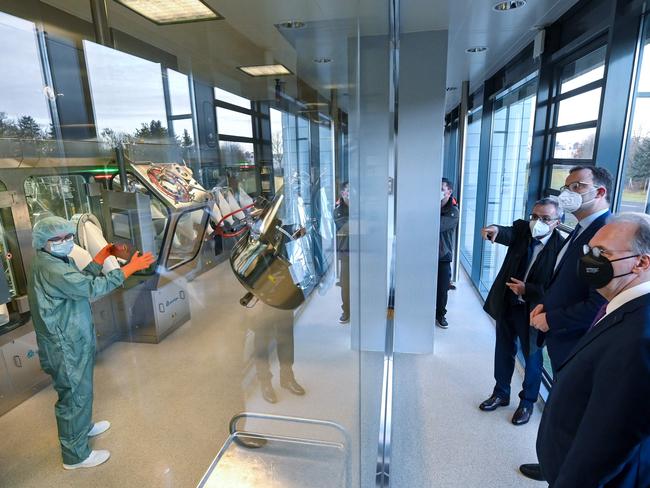
“Of course, all vaccines from our portfolio will be evaluated very carefully by our European Medicines Agency, the EMA,” she added.
“They will be only authorised and placed on the market if they are safe and if they are effective. Transparency here is crucial and of utmost importance.”
MODERNA BOSS ISSUES WARNING
But Moderna’s coronavirus vaccine may not get life back to normal right away because it hasn’t yet been proven to prevent the deadly bug from spreading, the company’s top doctor says, according to the New York Post.
While the biotech firm’s shot is effective at preventing people from getting sick with COVID-19, there’s no hard evidence that it stops them from carrying the virus “transiently” and potentially infecting others who haven’t been vaccinated, according to Dr Tal Zaks, Moderna’s chief medical officer.
“I think we need to be careful, as we get vaccinated, not to over-interpret the results,” Dr Zaks told Axios in a TV interview released on Monday. “When we start the deployment of this vaccine, we will not have sufficient concrete data to prove that this vaccine reduces transmission.”
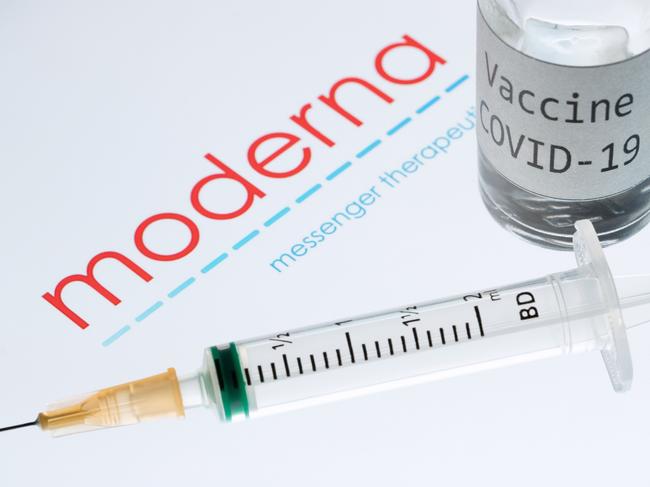
“Do I believe that it reduces transmission? Absolutely yes, and I say this because of the science,” he added. “But absent proof, I think it’s important that we don’t change behaviours solely on the basis of vaccination.”
Massachusetts-based Moderna revealed last week that its experimental vaccine was nearly 95 percent effective in a late-stage clinical trial. Pfizer and AstraZeneca have also reported that their shots are highly effective at warding off COVID-19.
Pfizer asked the US Food and Drug Administration to clear its vaccine for emergency use on Friday, and Moderna is expected to submit a similar request in the coming weeks. But all three companies will have to navigate the logistical challenge of distributing the vaccines around the world once regulators approve the shots.
RUSSIA SAYS ITS VACCINE IS 95 PER CENT EFFECTIVE
Russia said on Tuesday its Sputnik V coronavirus vaccine was 95 percent effective and would be cheaper and easier to store than some alternatives, as the global race heats up to develop a jab.
The announcement was the latest in a flurry of breakthroughs as several vaccine makers worldwide published preliminary data showing efficacy rates of 90 percent and higher.
Countries are hoping to begin inoculating their populations by year’s end or in early 2021 to stop a pandemic that has claimed the lives of nearly 1.4 million people.
Russia was one of the first to announce the development of a vaccine in August, dubbed Sputnik V after the Soviet-era satellite, but before the start of final clinical trials.
In statement on Tuesday, the vaccine’s developers said preliminary data after trials involving thousands of volunteers showed “an efficacy of the vaccine above 95 percent” after a second dose.

Russia’s health ministry, the state-run Gamaleya research centre and the Russian Direct Investment Fund (RDIF) said in the statement they expected the vaccine to record an even higher effectiveness after the next analysis.
“No unexpected adverse events were identified as part of the research,” it said, though some of those vaccinated suffered short-term effects including fever, weakness, fatigue, and headache.
The two-dose vaccine will be available on international markets for less than $US10 ($A13.60) per dose, they said, and will be free for Russian citizens.
It can be stored at between two and eight degrees Celsius, they said, instead of the temperatures far below freezing required for some other vaccines.
Western experts have in the past expressed concern over Russia’s vaccine, fearing that its development could be rushed.
Russia has applied to the World Health Organization for accelerated registration and pre-qualification of the Sputnik V vaccine.
President Vladimir Putin last week said that Russia had manufacturing agreements in place with China and India and encouraged Brazil and South Africa to also mass produce Russian-developed vaccines.
The head of the RDIF, Kirill Dmitriev, said Tuesday that European Union member Hungary would also manufacture the Sputnik V vaccine.
Russia in recent weeks has registered a steep increase in new coronavirus infections but has stopped short of introducing strict measures like some European countries.
MORE NEWS
Vaccination will be compulsory for Qantas passengers


